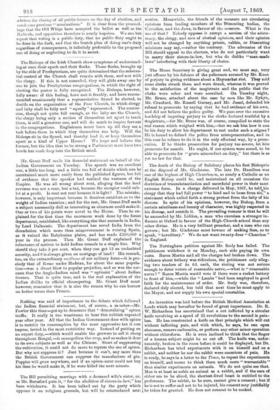Mr. Grant Duff made his financial statement on behalf of
the Indian Government on Tuesday. The speech was an excellent one, a little too long, and a little too full of details which can be .ascertained much more easily from the published figures, but full of evidence that the speaker had realized the vastness of the Empire. He was all wrong about rent, alleging that the land revenue was not a rent, but a tax, because the occupier could sub- let at a profit. Is rent not rent because it is light? The mistake, however, is only important because it deceives outsiders as to the weight of Indian taxation ; and for the rest, Mr. Grant Duff made a subject necessarily dull as interesting as clearness could make it. One or two of his points were novel to the House. Thus he ex- plained for the first time the enormous work done by the forest department, established, like everything else that succeeds in India, by Lord Dalhousie. The department has saved India from the -denudation which more than misgovernment is ruining Spain, as it ruined the Babylonian plains, and has made 1350,000 a year in the process. Then Mr. Grant Duff explained the reluctance of natives to hold Indian consols in a single line. Why should they take 5 per cent. when they can get 12 on undoubted security, and 8 is always given on mortgage of land? His remark, too, on the extraordinary smallness of our military force—it is pre- cisely that of Rome under Hadrian, for about the same popula- tion—was a direct blow to popular prejudice, and so was the sar- casm that the Anglo-Indian mind was " optimist " about Indian finance. That is quite true, and is the real explanation of the Indian dislike to official cheeseparing. Mr. Grant Duff mast however, remember that it is also the reason why he can borrow on better terms than France.






























 Previous page
Previous page